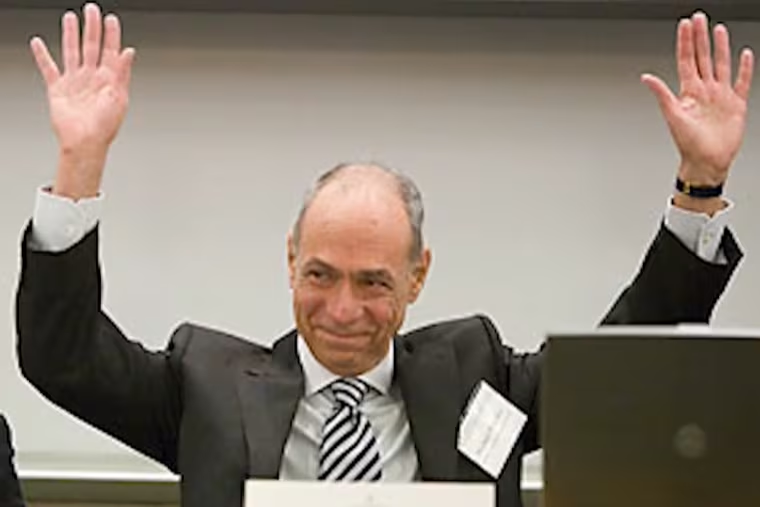Michael L. Wachter, economist, former interim provost, and founder of Penn’s Institute for Law & Economics, has died at 79
He helped shape the University of Pennsylvania in countless way, and the Michael L. Wachter Distinguished Fellowship in Law was created in 2020 in his honor.

Michael L. Wachter, 79, of Tredyffrin Township, former deputy provost and interim provost at the University of Pennsylvania, founder of Penn’s prestigious Institute for Law & Economics, professor emeritus, influential economist, and writer, died Saturday, Sept. 3, at the Hospital of the University of Pennsylvania of pneumonia after a fall.
A lifelong innovator who saw the big picture as well as the details that make new ideas practical, Professor Wachter was a prolific economic researcher and reformer who took an early interest in unemployment, wage fluctuations, and the conflicting roles of corporations in society. His expertise led to serving as a member of the minimum wage study commission established by Congress in 1978 and consultant to the Council of Economic Advisers, the Congressional Budget Office, the Federal Reserve System, and other organizations.
Recognizing underutilized relationships between experts in business, economics, and the law, he founded Penn’s Institute for Law & Economics in 1980. By streamlining the natural connections among the university’s Carey Law School, the Wharton School of Business, and the department of economics, he created a cross-disciplinary research consortium that hosted conferences, seminars, workshops, and other events designed to “bridge the gap between academics and practitioners.”
He also partnered with his wife and fellow Penn professor, Susan M. Wachter, to research and publish, and their public events included appearances by former Secretary of State Henry Kissinger, Sen. Alan Cranston (D., Calif.), and Alan Greenspan, former chairman of the Federal Reserve. “He loved scholarship and used it to improve and inform,” his wife said. “He made it interact with real change.”
Professor Wachter joined the Penn faculty in 1970 right out of Harvard University and became professor of economics in 1976, professor of management in 1980, and professor of law and economics in 1984. As Penn’s deputy provost from 1995 to 1998 and interim provost in 1998, he shaped the school’s budget and strategic planning, improved student housing, developed free-speech guidelines, and contributed to its “one university” academic access initiative.
Colleagues called him “the consummate administrator” and “ahead of the curve,” noted his “singular vision,” and labeled his contributions as “legendary” and “of enormous importance.” Former Penn president Judith Rodin said in a tribute video that “dignity and aplomb” characterized his tenure.
“There is a selfless quality about Michael Wachter,” Leo E. Stine Jr, former chief justice of the Delaware Supreme Court and adjunct professor at Penn, said in a video tribute. It’s “a commitment to the institution and those it’s supposed to serve that is old school in the very best sense.”
Professor Wachter introduced corporate law classes to the university, published more than 100 influential papers, including in The Inquirer, and served as a mentor to students across the academic spectrum. “Mike Wachter literally changed my life,” a former student said in a video tribute. Penn’s law school established the Michael L. Wachter Distinguished Fellowship in Law in 2020.
“I lucked out,” Professor Wachter said in a video marking his 50 years at Penn. “A lot of people, when they choose a career, choose a career that is going the wrong way. I had no idea I was choosing a career that was going the right way. But it went the right way.”
Born March 12, 1943, in Manhattan Beach, N.Y., Professor Wachter attended Cornell University’s School of Industrial and Labor Relations and earned a master’s degree and doctorate in economics at Harvard in 1970. He met Susan Jaffe in front of Harvard’s economics library in 1965, and they married in 1968, lived in Tredyffrin Township, and had daughter Jessica and son Jonathan.
Away from work, Professor Wachter played tennis, collected coins, had a green thumb in the garden, and studied the history of World War II. He wrote an unpublished autobiography, enjoyed watching sports, and appreciated fish, birds, and animals.
He taught his children and grandchildren to “think of all the advantages you have” that others don’t, his daughter said in a tribute. She also noted his “live sense of humor and joyous energy.”
She said: “We all benefit from my dad’s hard work and accomplishments in ways we will never know, but he would have been OK with that.” One of Professor Wachter’s favorite sayings, she said, was: “It is amazing how much you can accomplish if you do not need to claim credit.”
Professor Wachter’s son said: “How we lead our lives was up to us, but living a good life means fulfilling your obligations to others. At the most important moments, we could count on Dad’s guidance to help get this right.”
His wife said: “He had a generosity of spirit and was always looking for the good.”
In addition to his wife and children, Professor Wachter is survived by eight grandchildren, a sister, and other relatives.
Services were Sept. 4.
Donations in his name may be made to the Michael Wachter Endowed Business Law Fund, University of Pennsylvania Carey Law School, P.O. Box 71332, Philadelphia, Pa. 19176.